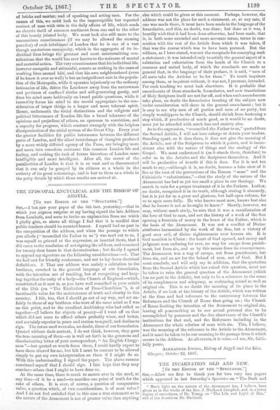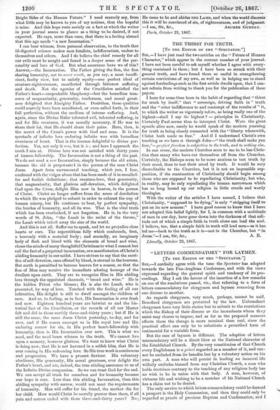THE INCARNATION OLD AND NEW.
[ro THE EDITOR OF THE "SPECTATOR."]
Stn,—Allow me first to thank you for two very fine papers which appeared in last Saturday's Spectator on "The Dark and
* Much light on tho nature of the Atonement has, I believe, been given us in the works of the Rev. J. MacLeod Campbell, and, in a lower region of sacredness, of Dr. Young, on "The Life and Light of Men," and of the American Dr. Bushnell. Bright Sides of the Human Future." I need scarcely say, from what little may be known to you of my notions, that the hopeful is mine. And this hope rests mainly on a fact at which the writer in your journal seems to glance as a thing to be desired, if not expected. He says, more than once, that there is a feeling abroad that this age needs "a new Incarnation."
I can bear witness, from personal observation, to the truth that ill-digested science makes men fatalists, indifferentists, useless to themselves and others. And I do believe the chief remedy for all our evils must be sought and found in a deeper sense of the per- sonality and love of God. But what assurance have we of this? Answer,—the Incarnation. The Father giving the Son, the Son sharing humanity, not to avert wrath, as you say, a most insuffi- cient, faulty view, but to satisfy equity—one perfect ideal of creature-righteousness, manifested through bitterest suffering and death. Not the agonies of the Crucifixion satisfied the Father's heart—unspeakable blasphemy—but the boundless trea- sures of magnanimity, generosity, tenderness, and moral great- ness delighted that Almighty Father. Doubtless, these qualities could scarcely have been manifested, or even called forth, in their full perfection, without the medium of intense suffering. And, again, since the Divine Ruler tolerated evil, tolerated suffering, in and for His creatures, it was morally necessary, if He was to share their lot, that He should share their pains. Here, then, is the secret of the Cross's power with God and man. It is the spectacle of infinite love enduring infinite woe with boundless sweetness of heart. That is the incense delightful to divine per- fection. Yes, not only it was, but it is ; and here I approach the truth I aim at. Divine love was not satisfied with thirty years of human fellowship. The Incarnation is not a thing of the past. We do not need a new Incarnation, simply because the old exists, because the old is perpetuated in the person of the man Christ Jesus. Apart from sacramental teaching, which you, I fear, confound with the vulgar abuse that has been made of it in uncalled- for and foolish definitions ; that creature-love, that generosity, that magnanimity, that glorious self-devotion, which delighted God upon the Cross, delight Him now in heaven, in the person of Christ. Christ no longer suffers from the sense of desolation to which He was pledged to submit in order to exhaust the cup of human misery, but He continues to bear, by perfect sympathy, the burden of humanity, and all its woe. That is the vital truth which has been overlooked, if not forgotten. He is, in the very words of St. John, "the Lamb in the midst of the throne," the Lamb which taketh away the sins of the world.
And this is not all. Suffer me to speak, and let no prejudice close hearts or ears. The superstitious folly which confounds, first, a heavenly with a material body ; and secondly, an imaginary body of flesh and blood with the elements of bread and wine, closes the minds of many thoughtfulChristians to what I cannot but call the fact of a perpetual incarnation, or a manifestation of Christ's abiding humanity in our midst. I have striven to say that the sacri- fice of self-devotion, once offered by blood, is eternal in the heavens. But earth is permitted to become heaven for a season, so that the Son of Man may receive the immediate adoring homage of the dwellers upon earth. They are to recognize Him in His abiding love through the appointed channels, "bread and wine." He is the hidden Priest who blesses ; He is also the Lamb, who is presented, by way of love. Touched with the feeling of all our infirmities, His delight is still to dwell amongst the children of men. And so, to feeling, as in fact, His Incarnation is ever fresh and new. Eighteen hundred years are betwixt us and the his- torical fact of the Crucifixion, or the records of all our Master felt and did in those earthly three-and-thirty years ; but if He is still the same, the same Jesus Christ yesterday, to-day, and for ever, and if He comes amongst us in His royal love and His enduring sorrow for sin, in His perfect heart-fellowship with humanity, then is His Incarnation ever new. This is what we need, and the need bears witness to the truth. We cannot live upon a memory, however glorious. We want to know what Christ is doing now, that He is not havened in a selfish bliss, that He is ever coming in His redeeming love. So His true work is continuous and progressive. We have a present Saviour. His voluntary obedience, His generosity, His moral greatness, ever delight the Father's heart, and are, indeed, the true abiding assurance to us of the Infinite Divine compassion. So we can trust God for the end. We can accept all trials for ourselves and for humanity because our hope is sure. Less than this abiding Incarnation, than this abiding sympathy with sorrow, would not meet the requirements of humanity. Man will suffer for his friend, the mother die for her child. How would Christ be morally greater than these, if all pain and sorrow ended with those three-and-thirty years? No; He came to be and abides THE LAMB, and when the world disceniii this it will be convinced of sin, of righteousness, and of judgment'.
Paris, October 23, 1867.



































 Previous page
Previous page